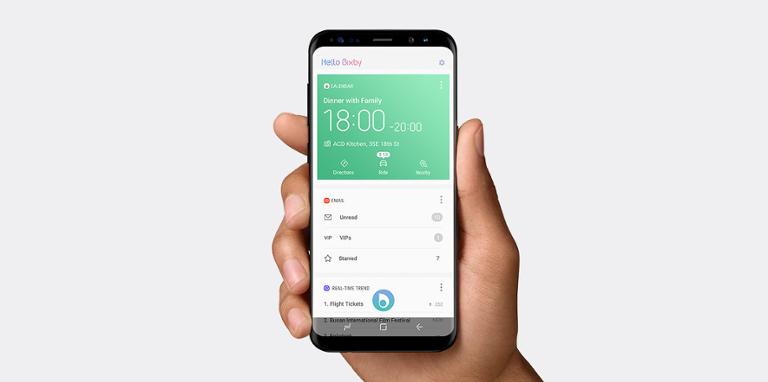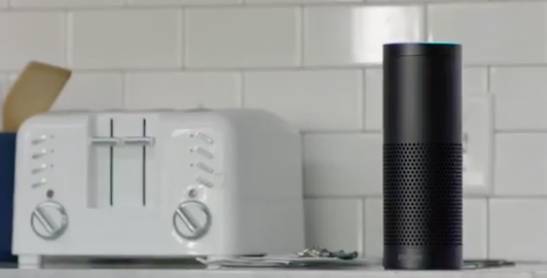
[caption id="attachment_140774" align="aligncenter" width="1204"]  Samsung Bixby[/caption] If Samsung has its way, you’ll be using ‘Bixby’ on your new phone later this month. In conjunction with the launch of its S8 and S8 Plus handsets, Samsung announced a new digital assistant, and thinks traveling a different path will help it stand out in a crowded space. Bixby wasn’t built to be a Siri clone, and it doesn’t have the partnerships to keep up with Alexa, so it’s relying on being unique. Dr. Injong Rhee, Bixby’s father at Samsung, tells The Verge: “The persona for Bixby that we’re pursuing is a bright sidekick, a much more friendly agent to users. Bixby is capable of developing a new interface to our devices, or devices that are going to host Bixby. Our perspective is to make the interface of the phone simpler and more natural to use.” At Samsung’s launch event for the S8, it showed off Bixby’s various capabilities. Though limited, the platform can use image recognition to find similar items online, and be accessed via voice or touch; it has a dedicated hardware button on the S8 and S8 Plus. Samsung thinks this makes Bixby easier to use:
Samsung Bixby[/caption] If Samsung has its way, you’ll be using ‘Bixby’ on your new phone later this month. In conjunction with the launch of its S8 and S8 Plus handsets, Samsung announced a new digital assistant, and thinks traveling a different path will help it stand out in a crowded space. Bixby wasn’t built to be a Siri clone, and it doesn’t have the partnerships to keep up with Alexa, so it’s relying on being unique. Dr. Injong Rhee, Bixby’s father at Samsung, tells The Verge: “The persona for Bixby that we’re pursuing is a bright sidekick, a much more friendly agent to users. Bixby is capable of developing a new interface to our devices, or devices that are going to host Bixby. Our perspective is to make the interface of the phone simpler and more natural to use.” At Samsung’s launch event for the S8, it showed off Bixby’s various capabilities. Though limited, the platform can use image recognition to find similar items online, and be accessed via voice or touch; it has a dedicated hardware button on the S8 and S8 Plus. Samsung thinks this makes Bixby easier to use:
 Apple's Siri digital assistant on macOS.[/caption]
Apple's Siri digital assistant on macOS.[/caption]
 Alexa Echo with Alexa[/caption]
Alexa Echo with Alexa[/caption]
 Samsung Bixby[/caption] If Samsung has its way, you’ll be using ‘Bixby’ on your new phone later this month. In conjunction with the launch of its S8 and S8 Plus handsets, Samsung announced a new digital assistant, and thinks traveling a different path will help it stand out in a crowded space. Bixby wasn’t built to be a Siri clone, and it doesn’t have the partnerships to keep up with Alexa, so it’s relying on being unique. Dr. Injong Rhee, Bixby’s father at Samsung, tells The Verge: “The persona for Bixby that we’re pursuing is a bright sidekick, a much more friendly agent to users. Bixby is capable of developing a new interface to our devices, or devices that are going to host Bixby. Our perspective is to make the interface of the phone simpler and more natural to use.” At Samsung’s launch event for the S8, it showed off Bixby’s various capabilities. Though limited, the platform can use image recognition to find similar items online, and be accessed via voice or touch; it has a dedicated hardware button on the S8 and S8 Plus. Samsung thinks this makes Bixby easier to use:
Samsung Bixby[/caption] If Samsung has its way, you’ll be using ‘Bixby’ on your new phone later this month. In conjunction with the launch of its S8 and S8 Plus handsets, Samsung announced a new digital assistant, and thinks traveling a different path will help it stand out in a crowded space. Bixby wasn’t built to be a Siri clone, and it doesn’t have the partnerships to keep up with Alexa, so it’s relying on being unique. Dr. Injong Rhee, Bixby’s father at Samsung, tells The Verge: “The persona for Bixby that we’re pursuing is a bright sidekick, a much more friendly agent to users. Bixby is capable of developing a new interface to our devices, or devices that are going to host Bixby. Our perspective is to make the interface of the phone simpler and more natural to use.” At Samsung’s launch event for the S8, it showed off Bixby’s various capabilities. Though limited, the platform can use image recognition to find similar items online, and be accessed via voice or touch; it has a dedicated hardware button on the S8 and S8 Plus. Samsung thinks this makes Bixby easier to use:
Another example of removing friction will be the dedicated Bixby button that will be located on the side of our next device. Confusion around activating a voice interface is a barrier we have removed to make it feel easier and more comfortable to give commands. For example, instead of taking multiple steps to make a call – turning on and unlocking the phone, looking for the phone application, clicking on the contact bar to search for the person that you’re trying to call and pressing the phone icon to start dialing – you will be able to do all these steps with one push of the Bixby button and a simple command.[caption id="attachment_137343" align="aligncenter" width="654"]
 Apple's Siri digital assistant on macOS.[/caption]
Apple's Siri digital assistant on macOS.[/caption]
Is Bixby Even Necessary?
Distilled to its purest form, Bixby is another digital assistant you launch from your phone that can perform web searches and recognize (some) items using the camera. Samsung says it can translate 52 languages (Siri can do about 30), though it’s not clear how good that translation is. Bixby has some differentiators, though maybe not enough. Image recognition is a clever use-case, and something Google Assistant and Siri just don’t do well (or at all). Samsung may not have hit it out of the park here, either. From Gizmodo:We pointed the phone at a backpack and it instantly found bags a similar color. But Bixby is not infallible. We tried to get it to look at a Samsung Galaxy S8, at the time still a device made up of leaks and rumors, and it struggled to identify itself, and instead pulled up the ancient LG G2.Ouch. Samsung also promises Bixby will let users be more productive by allowing them to seamlessly use voice or touch inside applications. In theory, that could mean messaging multiple people; if you were typing a message to a friend, responding to your mother’s incoming chat notification via voice while typing might be possible. Perhaps the biggest promise Samsung is making has to do with context. It says Bixby “will be smart enough to understand commands with incomplete information and execute the commanded task to the best of its knowledge, and then will prompt users to provide more information and take the execution of the task in piecemeal.” Doing this helps reduce the learning curve of using a new assistant, says Samsung, when remembering commands or phrases can be cumbersome. [caption id="attachment_125062" align="aligncenter" width="547"]
 Alexa Echo with Alexa[/caption]
Alexa Echo with Alexa[/caption]


